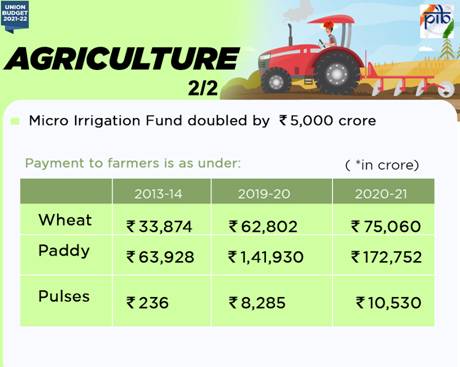New Delhi: In a slew of steps to support the Agriculture Sector, Union Minister for Finance & Corporate Affairs Smt. Nirmala Sitharaman announced 9 measures for Agriculture Sector as part of inclusive development for aspirational India while presenting the Union Budget 2021-22 in Parliament here today.
SWAMITVA Scheme
Smt. Sitharaman proposed to extend SWAMITVA Scheme to all States/UTs. Earlier this year, Hon’ble Prime Minister Shri Narendra Modi had launched SWAMITVA Scheme to bring transparency in property ownership in villages. Under the Scheme, a record of rights is being given to property owners in villages. Up till now, about 1.80 lakh property-owners in 1,241 villages have been provided cards.

Agricultural credit target enhanced to Rs 16.5 lakh crore in FY22
To provide adequate credit to our farmers, the Finance Minister enhanced the agricultural credit target to Rs 16.5 lakh crore in FY22. Smt. Sitharaman further said that the Government will focus on ensuring increased credit flows to animal husbandry, dairy, and fisheries.
33% increase Rural Infrastructure Development Fund
The Finance Minister also announced the enhanced the allocation to the Rural Infrastructure Development Fund from Rs 30,000 crore to Rs 40,000 crore.
Micro Irrigation Fund doubled
Smt. Sitharaman proposed to double Micro Irrigation Fund, started with a corpus of Rs 5,000 crore under NABARD, by augmenting it by another Rs 5,000 crore.
Operation Green Scheme – ‘TOPS’ to include 22 more perishable products
To boost value addition in agriculture and allied products and their exports, Smt. Sitharaman proposed to increase the scope of ‘Operation Green Scheme’ that is presently applicable to tomatoes, onions, and potatoes (TOPS), to be enlarged to include 22 perishable products.
1,000 more mandis to be integrated with e-NAM
The Finance Minister said that around 1.68 crore farmers are registered and Rs 1.14 lakh crore of trade value has been carried out through e-NAMs. Keeping in view the transparency and competitiveness that e-NAM has brought into the agricultural market, the Finance Minister proposed to integrate 1,000 more mandis with e-NAM to bring transparency and competitiveness.
APMCs to get access to Agriculture Infrastructure Fund
The Finance Minister proposed to make available the Agriculture Infrastructure Fund to APMCs for augmenting their infrastructure facilities.
To develop 5 major fishing harbours proposed
Smt. Sitharaman proposed substantial investments in the development of modern fishing harbours and fish landing centres. The Finance Minister said that to start with, 5 major fishing harbours – Kochi, Chennai, Visakhapatnam, Paradip, and Petuaghat – will be developed as hubs of economic activity. Smt. Sitharaman also proposed to develop inland fishing harbours and fish-landing centres along the banks of rivers and waterways.
Multipurpose Seaweed Park to be established in Tamil Nadu
Recognising the potential in Seaweed farming. the Finance Minister said that it is an emerging sector with potential to transform the lives of coastal communities – it will provide large scale employment and additional incomes. To promote seaweed cultivation, Smt. Sitharaman proposed a Multipurpose Seaweed Park to be established in Tamil Nadu.
Reiterating the commitment of the Government to the welfare of farmers over the years, Smt. Sitharaman said that there is a steady increase the procurement of wheat, rice, pulses from farmers. The Finance Minister said that the Minimum Support Price (MSP) regime has undergone a sea change to ensure price that is at least 1.5 times the cost of production across all commodities.
Providing details of procurement and amount paid to farmers over the years, Smt. Sitharaman said that in case of wheat, the total amount paid to farmers in 2013-2014 was Rs 33,874 crore. In 2019-2020 it was Rs 62,802 crore, and even better, in 2020-2021, this amount, paid to farmers, was Rs 75,060 crore. The number of wheat growing farmers that were benefitted increased in 2020-21 to 43.36 lakh as compared to 35.57 lakh in 2019-20.
For paddy, the amount paid in 2013-14 was Rs 63,928 crore. In 2019-2020 this increased Rs 1,41,930 crore. Even better, in 2020-2021, this is further estimated to increase to Rs 172,752 crore. The farmers benefitted increased from 1.24 crore in 2019-20 to 1.54 crore in 2020-21. In the same vein, in case of pulses, the amount paid in 2013-2014 was Rs 236 crore. In 2019-20 it increased Rs 8,285 crore. Now, in 2020-2021, it is at Rs 10,530 crore, a more than 40 times increase from 2013-14.
The receipts to cotton farmers have seen a stupendous increase from Rs 90 crore in 2013-14 to Rs 25,974 crore (as on 27th January 2021).

A comparison of payment to farmers has substantially increased shown as under:
(Rs in crore)
| 2013-14 | 2019-20 | 2020-21 | |
| Wheat | Rs 33,874 | Rs 62,802 | Rs 75,060 |
| Rice | Rs 63,928 | Rs 1,41,930 | Rs 172,752 |
| Pulses | Rs 236 | Rs 8,285 |

Comments are closed.